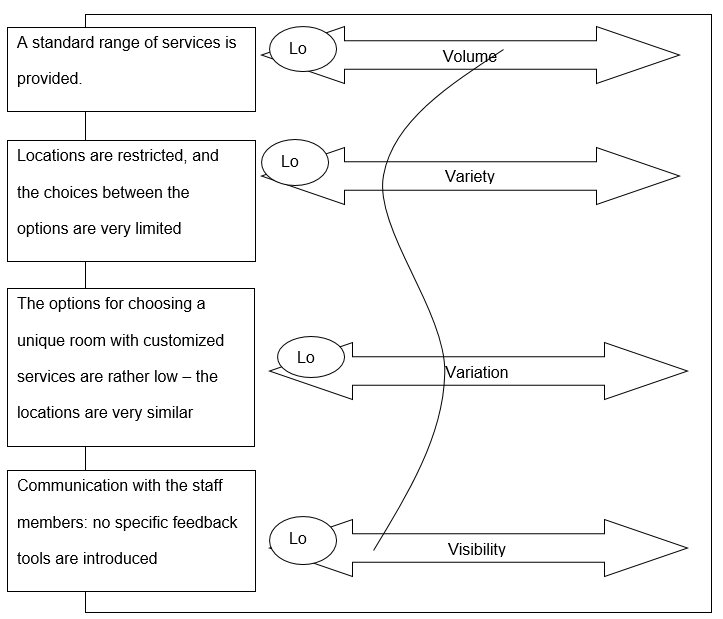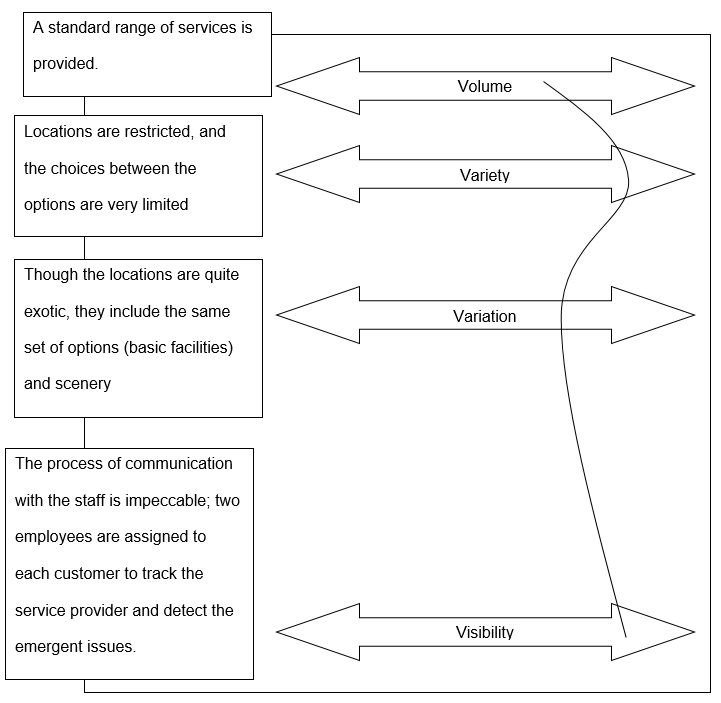Introduction
Creating the environment in which the customer can be fully satisfied with the services that they are provided with and where the communication process between the key stakeholders occurs in a natural manner is crucial to the company’s success (Khalid, Hashim, & Richardson, 2015). Therefore, for the organizations operating in the hospitality industry, it is crucial to make sure that the concepts of volume, variety, variation, and visibility should be part and parcel of the company’s operations (Rushton, Croucher, & Baker, 2014). Despite the fact that the hotels offer very different services, they are quite similar as far as each of the four dimensions is concerned; however, the Mwagusi Safari Lodge seems to have a bit more visibility in its services, which makes it a preferable option compared to the Formule 1 organization.


As the diagram above shows, the visibility of the Mwagusi Safari Lodge is, in fact, much higher than the one of Formula 1 (Slack, Chambers, & Johnson, 2010). The fact that each of the customers was provided with the services of two staff members, as well as the customization to the client’s needs carried out by the guide, proves that the company prefers open communication and direct transfer of information from the guests to the employees. As a result, no misunderstandings or misconceptions may occur in the process (Van der Wagen & Goonetilleke, 2015).
From the perspective of the various dimension, however, the two hotels offer rather similar services. Both are restricted to a single location and do not allow clients to have different experiences as far as the area of residence is concerned; it is either a prefabricated unit or a camp-like experience with the necessary facilities attached. Therefore, the variable rates are quite low in both cases (Buyya, Calheiros, & Dastjerdi, 2016).
For the same reasons, the variation rates are nearly the same in both instances. One might argue that Mwagusi Safari Lodge offers slightly more variation as its managers state specifically that the staff members tend to the needs of each customer. The process of controlling costs, therefore, is less rigid in the identified organization, whereas in the Formule 1 Company, costs control is executed mechanically, with very little variation occurring in the process. Finally, the volume of Formule 1 is much greater than the one of the Mwagusi Lodge, which provides a much more intimate environment (Bendell, 2016).
Thus, the Mwagusi Safari Lodge wins by a very narrow margin. Although the two companies look strikingly different, they provide very similar services. Each had found its unique niche, the firms create an unforgettable impression and are capable of attracting customers successfully.
Reference List
Bendell, T. (2016). Building anti-fragile organisations: Risk, opportunity and governance in a turbulent world. New York, NY: Routledge.
Buyya, R., Calheiros, R. N., & Dastjerdi, A. V. (2016). Big data: Principles and paradigms. New York, NY: Morgan Kaufmann.
Khalid, S. N. A., Hashim, F., & Richardson, C. (2015). Improving performance and enhancing competitiveness: In search of innovative solutions. Kuala Lumpur: Penerbit USM.
Rushton, A., Croucher, P., & Baker, P. (2014). The handbook of logistics and distribution management: Understanding the supply chain. New York, NY: Kogan Page Publishers.
Slack, N., Chambers, S., & Johnson, R. (2010). Operations management. Upper Saddle River, NJ: Pearson Education.
Van der Wagen, L., & Goonetilleke, A. (2015). Hospitality management, strategy and operations. Melbourne: Pearson Higher Education AU.